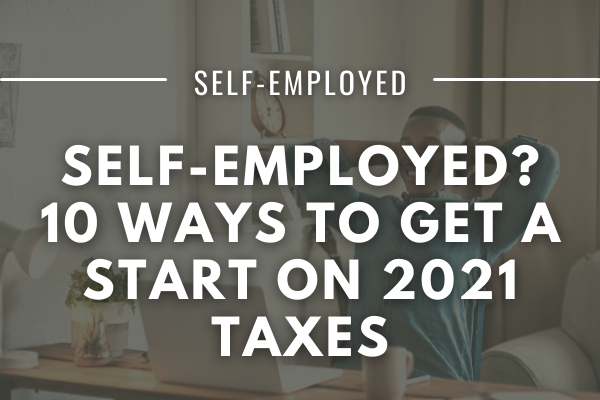10 Things Self-Employed Earners Can Do To Prepare For Tax Season
It’s that dreaded time of year again. The holidays are over and April 15th is right around the corner. There’s no avoiding giving Uncle Sam his due and, if you want to avoid an audit, it’s important to do your self-employed taxes right the first time. Unlike W-2 employees, self-employed taxes are not automatically deducted from their paychecks. It’s up to the self-employed to keep track of what taxes they owe and pay it on time.
Below are 10 ways to get a jump start on the 2021 Tax Season for the Self-Employed.
Self-Employed Tax Tip #1
Gather detailed receipts for ANY deductible expense that are handy. Unfortunately, a bank statement listing “OFFICE_DEPOT****PURCHASE” won’t do. The IRS needs detailed items on a receipt to determine whether a purchase was for paper for your business printer, or the kid’s birthday invitations. Always ask W.W.A.D (What Would an Auditor Do).
Self-Employed Tax Tip #2
You’re probably using your car a fair bit for driving. Get a mileage log together in Excel or QuickBooks! Be sure to separate personal, commuting miles (home to office) and business (office to client). Try to get a picture of your beginning of year vs. end of year odometer, but if you miss this, there may be another record available to you. Look on an invoice from your oil change at the start of the year and you’ll see an odometer reading. Shoot for getting a reading near the end of the year and you’ll have an odometer year in/year out and second way to substantiate that mileage.
Self-Employed Tax Tip #3
Are you advertising? You should be! In fact, besides net profit, it is the key determination the IRS uses to determine whether a business is truly a business, or a hobby (you want to be considered a business). The SBA recommends as much as 7-8% of gross revenue on marketing your business.
Self-Employed Tax Tip #4
Any independent contractor you pay more than $600 in service to your business (“subcontractor”) needs to be issued 1099. This will be a deduction for you, and a proof of income for them on their IRS transcript.
Self-Employed Tax Tip #5
Explore retirement accounts now. If you haven’t already, this may be your best year to establish one, especially if you anticipate revenue growth next year. A SEP-IRA, for example, may help you defer up to 20% of your income and 25% for employees of yours. Ask your tax pro/financial advisor which plan is right for you!
Self-Employed Tax Tip #6
Make sure you’re up to date on estimated payments. If you expect to owe more than $1000 for this past year, it’s time to consider estimated tax payments. These payments are due April, June, September, and January for individuals and must add up to 1.) 100% of the previous tax year’s liability, or 2.) 90% of this past year’s liability.
Self-Employed Tax Tip #7
Collected unemployment this year? Keep in mind that unemployment benefits are taxable amounts, including weekly additional stimulus (the Economic Impact Payment does not count as taxable income). Make sure you have been withholding tax on these amounts, or you could expect to owe during tax season.
Self-Employed Tax Tip #8
Are you a reseller? You might be overpaying on sales tax. For most states, you can issue a resale certificate to the supplier (in lieu of paying sales tax) for any item you plan to hold solely for resale. Note to resellers buying from out-of-state suppliers: there are currently 10 states that do not accept resale certificates from out-of-state, including Alabama, California, Florida, Hawaii, Illinois, Louisiana, Maryland, Massachusetts, Washington, and Washington D.C.
Self-Employed Tax Tip #9
Give to charity! For 2020, thanks to a new provision in the Cares Act, even taxpayers who don’t itemize may give up to $300 in deductible charitable contributions. Keep in mind, that 1.) these expenses must be backed up with a receipt and 2.) the must be to a qualified tax-exempt 501(c)(3) organization (be sure to ask the organization if you are unsure).
Self-Employed Tax Tip #10
Ask us your tax questions early on! At DiLucci, our team of credentialed staff prides itself in researching to save you the most money on your tax bill. The earlier in the season you reach out to us with your questions, the better!

